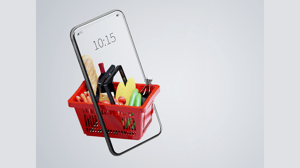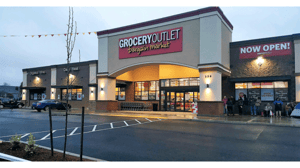UNFI ramps up business with new, existing customers in Q1UNFI ramps up business with new, existing customers in Q1
E-commerce is ‘fastest-growing portion of our business,’ President Christopher Testa says
December 9, 2020

Strategic initiatives, new business, and strong retail and e-commerce performances boosted results at United Natural Foods Inc. (UNFI) for its fiscal 2021 first quarter.
For the quarter ended Oct. 31, net sales totaled $6.67 billion, up 6% from $6.3 billion a year earlier, UNFI said Wednesday.
“We delivered another quarter of strong financial results. First-quarter sales grew 6%, and first-quarter adjusted EBITDA grew 31%, resulting in a 45-basis-point expansion in adjusted EBITDA margin,” Chairman and CEO Steven Spinner told analysts in a conference call. “With the strength we have shown during the last three quarters, the tremendous confidence we have in our company and our strong commitment to increasing shareholder value, it’s clear to us that the best days for UNFI lie ahead, as we continue to build and optimize our DC network, expand our brands, win new business and migrate our business towards customer solutions, and expand our fastest-growing segment, e-commerce.”
 Steven Spinner, UNFI chairman and CEO (Photo courtesy of United Natural Foods Inc.)
Steven Spinner, UNFI chairman and CEO (Photo courtesy of United Natural Foods Inc.)
The grocery distributor’s biggest business unit, Chains (retailer customers with more than 10 stores), saw sales rise 5% to $3.02 billion. Even larger gains were reported for the Supernatural unit (customer Whole Foods Market), up 9.3% to $1.21 billion, and the Independent unit (retail customers with fewer than 10 stores), up 7.4% to $1.67 billion. Sales dipped 1.5% to $581 million at the Other business unit, which includes international customers outside Canada, foodservice, e-commerce, conventional military and other business.
UNFI drives new business, secures top customers
“Sales to our top 100 customers, representing nearly 70% of total net sales, were up approximately 10.5%. We believe our strong sales performance is being driven in large part by our long-term strategies we have discussed during previous calls, as well as favorable consumer trends and specific channels. Namely, cross-selling efforts yielded an additional $60 million in incremental sales in the quarter. As we’ve discussed, previous cross-selling efforts consisted largely of many small wins with new-item introductions. In fiscal 2021, we’re beginning to realize larger wins as customers begin to aggregate more purchases with UNFI,” President Christopher Testa said in the call.
“We continue to believe that increasing share of wallet with our current customer base of nearly 15,000 is a unique and very large growth opportunity for UNFI,” he explained. “This includes selling more natural products to conventional operators and vice versa, extending professional services, and increasing the penetration of private brands and fresh categories. We estimate UNFI has a $140 billion addressable market, including $38 billion from incremental revenue, from cross-selling to our existing customer base.”
Both Testa and Spinner cited UNFI’s new long-term pact with Key Food Stores Co-Operative as a big win.
“We expect our sales to Key Food to total approximately $10 billion over 10 years, or roughly $1 billion annually,” said Spinner. “To serve Key Foods’ Northeast stores, we’ll open a new highly productive distribution center in Allentown, Pa., next fall. This facility will also serve as our enabler to significantly expand our conventional presence in the important New York City metro market. UNFI is well-prepared to grow in this market with general merchandise in an automated Carlisle, Pa., DC; large-scale natural DC in York, Pa.; large-scale conventional and fresh DC in Harrisburg, Pa.; and now our new DC in Allentown.”
The 9.3% sales growth with Amazon-owned Whole Foods, UNFI’s largest single customer, marked a 570-basis-point improvement from the fiscal 2020 fourth quarter, according to Testa. “This performance is largely being driven by center-store grocery items that are overcompensating for some of the declines from adversely impacted categories like bulk and prepared foods,” he said.
 UNFI President Christopher Testa (Photo courtesy of United Natural Foods Inc.)
UNFI President Christopher Testa (Photo courtesy of United Natural Foods Inc.)
Spinner noted that UNFI is gearing up to secure the Whole Foods business. “As to our largest customer, we’'ve begun the process to address our supply contract, which runs through October of 2025,” he said. “Since the pandemic broke, we have both been focused on operating our respective businesses and meeting the needs of our customers, efforts that will intensify during and through the holidays. We’ll heighten our focus on the contract renewal as we move into calendar 2021 and expect we’ll be able to announce a formal extension of our partnership early next calendar year.”
UNFI’s retail arm, including the Cub Foods and Shoppers chains from the 2018 Supervalu acquisition, posted first-quarter sales of $595 million, up 15.5% year over year. Identical-store sales surged almost 16%.
“The merchandising and operational changes we put in place over the past year continue to improve product mix and favorably drive results at both the Cub and Shoppers banners,” Testa said.
‘Accelerating importance’ of e-commerce
Both Cub and Shoppers also are getting a lift from e-commerce, which Testa called “the fastest-growing portion of our business” companywide and an “area of accelerating importance to the success of our customers.”
“Our e-commerce sales were up 93% in the quarter, including a nearly 300% sales growth to the largest e-commerce player, who has also grown into a top 25 customer for UNFI,” he said, alluding to Amazon. “It is estimated that e-commerce now represents 9% of total grocery purchases, and UNFI is positioned to take advantage of the strength in several ways, including partnering with e-commerce operators, selling an online platform to our brick-and-mortar customers and, through our own e-commerce businesses, under the UNFI Easy Options and on-screen platforms, which sell grocery and wellness items on a direct B2B basis.”
Testa pointed out that he’s seeing “secondary” e-commerce growth from brick-and-mortar customers using third-party online grocery solutions to sell products that they procure from UNFI. “To put this in perspective, Cub has averaged over 30,000 e-commerce orders per week, which has led to an e-comm sales increase of 200%,” he said. “Although we do not recognize these transactions in our e-commerce reporting, it's an example how UNFI is benefiting from this growing consumer behavior.”
Growth among brick-and-mortar retail customers also reflects the desire for consumers to shop local and at stores with smaller footprints close to their homes, Testa told analysts. “This is especially true in the independent channel, where we grew sales with 45 of our top 50 customers in this channel, including 30 that grew sales at double-digit rates,” he said.

To drive efficiency and cost savings, UNFI is working to consolidate 10 distribution centers in the Pacific Northwest and the Southwest to six facilities.
Improvement at the bottom line, upbeat outlook
UNFI posted a first-quarter net loss of just over $1 million, or 2 cents per diluted share, compared with a net loss of $383.9 million, or $7.21 per diluted share, a year ago. The Providence, R.I.-based company noted that the fiscal 2021 quarter includes $16.4 million of restructuring, acquisition and integration-related expenses plus $24.1 million of noncash charges, stemming mainly from the acceleration of unamortized debt issuance costs and original issue discounts from the prepayment of a term loan. The prior-year period, meanwhile, reflects $425.4 million in goodwill and asset impairment charges.
On an adjusted basis, UNFI’s net earnings per diluted share for the 2021 first quarter were 51 cents, compared with 4 cents in the 2020 quarter.
Analysts, on average, had projected adjusted EPS of 74 cents, with estimates ranging from a low of 49 cents to a high of $1, according to Refinitiv/Thomson Reuters.
“We believe the momentum from fiscal 2020 will continue as we grow sales and adjusted EBITDA in fiscal 2021 above and beyond our results from 2020, which were partially driven by COVID,” Spinner said in the analyst call. “As a result of COVID-19, many Americans have been working from home, as you know, for the past eight months and doing so quite effectively. This paradigm shift means more and more meals will continue to be eaten at home, with products that have come through UNFI’s distribution network. This trend will continue for the next several years as companies’ office strategies evolve. At UNFI, our requirements for administrative and support offices will continue to shrink over the next several years, as we’ve increased productivity and associated work flexibility with work from home.”
On the operations front, UNFI is working to consolidate 10 distribution centers in the Pacific Northwest and the Southwest to six facilities. Efforts are already under way in the Pacific Northwest, and next up are DCs in Santa Fe Springs and Vernon, Calif., whose volume will be absorbed by existing facilities in Southern California. UNFI is the nation’s largest publicly traded grocery distributor.
“In both the Pacific Northwest and Southwest projects, we are modernizing our facilities by deploying automation which has already proven to dramatically increase throughput levels, improve our capability to attract labor and lower operating cost,” Testa explained.
“By eliminating a net four DCs from the network, we’ve removed meaningful fixed costs associated with these extra buildings,” he added. “In the process, we’ve generated approximately $125 million in cash proceeds while creating a footprint that requires less investment in working capital, and we can realize lower net operating expenses. We’d expect to achieve these type of benefits to varying degrees as we analyze and review the balance of our network.”
The company also has achieved more stability on the labor front. “We’ve finalized new labor contracts at seven distribution centers, covering more than 1,200 associates,” said Testa. “We’re pleased with the long-term stability and flexibility these agreements provide, and we will continue to pursue the modernization of our labor agreements across the enterprise as we negotiate the renewal of these contracts.”
Looking ahead, UNFI affirmed its fiscal 2021 guidance. The company forecasts GAAP EPS (diluted) of $2.15 to $2.65 and adjusted EPS of $3.05 to $3.55. Net sales are pegged at $27 billion to $27.8 billion.
Wall Street’s consensus estimate is for adjusted EPS of $3.34, with projections running from $3.13 to $3.57, according to Refinitiv/Thomson Reuters.
“When we consider the strength and diversity of our growing customer portfolio, the large adjustable market opportunity in front of us, UNFI’s unmatched product and service offerings and scale and the relentless focus of our people to find solutions that benefit our customers,” Testa said in the call, “we’re confident we’ll continue to increase market share.”
About the Author
You May Also Like






